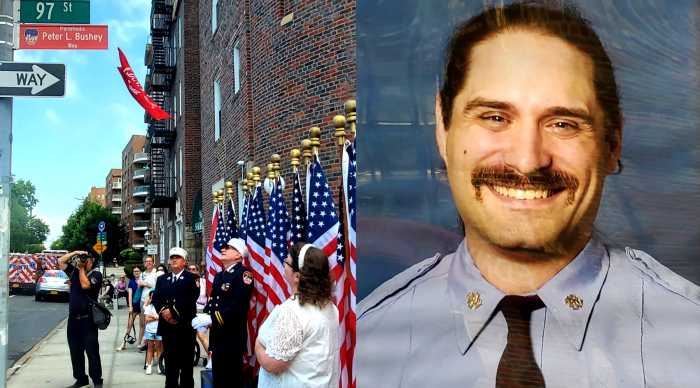
BY SARAH FERGUSON | Gregg Singer’s plan to convert the East Village’s old P.S. 64 into an upscale 500-bed dorm received favorable reviews from members of the Landmarks Preservation Commission on Tuesday. Although L.P.C. postponed a vote on the project pending further modifications, the commissioners generally praised the proposed reworking of the turn-of the-century elementary school as “inventive and appropriate.”
“I think it’s a great application,” said commissioner Joan Gerner, an architect and preservationist who helped oversee construction of the National September 11 Memorial and Museum. “A stroke of genius,” Gerner added, referring to the plan to replace the bulky wheelchair ramp on the Ninth St. courtyard with two smaller handicap-access ramps.
There were some quibbles over the proposed addition of glass panels and steel railings, and the obtrusive HVAC units and bulkheads, which might mar the historic mansard roof. But none of the commisioners even mentioned Singer’s role in scalping the terracotta details of the facade in 2006, which he had jackhammered in a last-ditch effort to undo the building’s landmark desgination.
Nor did L.P.C. take him to task for his abject neglect of the property over the last seven years — even though by law owners of landmarked buildings are required to keep them “in good repair.”
“I have always said that the best way to preserve a building is to reuse it in an appropriate way, so I think this is heading in that direction,” stated L.P.C. Chairperson Robert Tierney.
Such deference stood in contrast to the testimony of community members, including Councilmember Rosie Mendez, who urged L.P.C. to reject the dorm plan, calling it “inappropriate.”
Although L.P.C. has no authority to regulate how a landmarked property is used, Mendez argued that the communal legacy of the old P.S. 64 — first as a school for 60 years and then as the community center CHARAS — should be recognized.
“The history, architecture, cultural and community significance of this building is inexorably intertwined with the role it has played in the lives of successive generations on the Lower East Side,” Mendez wrote in a prepared statement read by a staffer.

Inside the gutted basement of the old P.S. 64. Developer Gregg Singer tore out the 400-seat auditorium where Tammany Hall Mayor Jimmy Walker and F.D.R. once spoke, and where the Fringe Festival was once staged. Photo by Sarah Ferguson
Mendez also condemned Singer’s scheme to chop out sections of the 10th St. elevated courtyard so as to provide light and air to the first floor — primarily so he can add more dorm bedrooms there. The school’s original architect, C.B.J. Snyder, had designed the courtyards to be open and accessible to the public — a fact noted by L.P.C. in its 2006 designation report. Singer’s dorm, Mendez noted, would “privatize” the courtyards.
“Many things have changed since 1904, but the need for shared open space that is a source of community pride has not,” Mendez noted.
Singer’s scheme got even worse reviews from the community members who testified. Carolyn Ratcliffe, who chairs the 9BC Tompkins Square Block Association, accused Singer of “disregarding the health and welfare” of local residents when workers cleared out the building’s fourth and fifth floors “by throwing the debris out of the windows without any protection from the dust that covered our buildings and apartments, as it fell into an uncovered dumpster at the first-floor level.”
More recently Ratcliffe said she sent L.P.C. pictures of large sections of copper flashing that had come loose under the dormer windows that Singer had jackhammered.
“These violations were only repaired when the Department of Buildings executed emergency repairs when 50 mile-per-hour winds were hitting the block,” Ratcliffe said.
The Buildings Department Web site shows a history of “hazardous” violations, including “loose brickwork” and “loose copper flashing.”

A Bobcat unloading dirt and bricks from the E. 10th St. entrance to the old P.S. 64. Singer has a permit to demolish all “non-load-bearing partitions.” Photo by Sarah Ferguson
Singer could not be reached for comment on Ratcliffe’s specific allegations. When asked about his overall neglect of the property in an interview at The Villager offices two weeks ago, Singer said he could not repair the building without an approved renovation plan.
“My hands are tied,” he said.
After Singer amends his plans to answer the commissioners’ recommendations, L.P.C. will schedule another public hearing and vote on whether to approve the dorm renovation.
It is then up to the Department of Buildings to approve the project. But thus far, D.O.B. has not weighed in on whether Singer’s proposed “University House” even qualifies as a legal dorm.
In order to meet the “community-facility use” standard, D.O.B. requires proof of either ownership by or a long-term lease with a school , or schools. The Cooper Union has announced plans to rent out two of the building’s five floors for 15 years, but the leasing arrangement remains unclear. Singer says Cooper is leasing 196 beds, while Cooper Union officials maintain that they have only “the right of first refusal” for these beds — meaning they might not take all of them if their students don’t want them. It is also unclear whether the students would be leasing from Singer or Cooper directly. Singer and Cooper Union have both declined to share copies of the lease, citing a confidentiality clause that Singer inserted.
In her letter, Mendez cited discrepancies in how Singer and Cooper described the contract to The Villager (“Scaled-down dorm pitched for embattled CHARAS site,” April 25), noting that there was little else to “shed light” on the deal.
On April 30, Mendez sent a formal complaint to D.O.B., demanding that the department review Singer’s dorm application with “precise scrutiny” and refrain from approving it until Singer can show “enforceable” leases for all 500 rooms.
“As you know the Dorm Rule was explicitly adopted to guard against ambiguous and speculative actions of this type,” she wrote.
Meanwhile, Mendez says she is setting up a meeting with Cooper Union President Jamshed Bharucha so that he can hear the “full history” of the property from community members, including CHARAS co-founder Chino Garcia and members of Community Board 3.
On May 15, there will be a march from the old P.S. 64 to Cooper Union to demand that the school reconsider its lease with Singer, as well as its decision to begin charging undergraduates after being tuition-free for 100 years. Members of the East Village Community Coalition, Cooper Union alums, state Senator Brad Hoylman, Assemblymember Brian Kavanagh, Mendez, Community Board 3 members and Students for a Free Cooper Union will be attending.
As The Villager went to press, C.B. 3’s Land Use Committee was weighing in on the dorm proposal. The full board will likely vote on the plan on Tues., May 28.
“I’m against any use for that building that does not include a true community benefit — including space for the CHARAS group that was displaced,” Land Use Chairperson Dave McWater told The Villager.
C.B. 3 Chairperson Gigi Li also opposes the dorm scheme.
“I personally do not feel a luxury dorm of that scale provides any benefit to that community,” Li said.



































